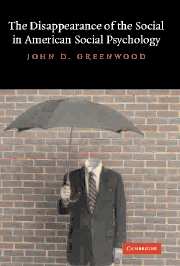Book contents
- Frontmatter
- Contents
- Preface
- Introduction: What Happened to the “Social” in Social Psychology?
- 1 The Lost World
- 2 Wundt and Völkerpsychologie
- 3 Durkheim and Social Facts
- 4 The Social and the Psychological
- 5 Social Psychology and the “Social Mind”
- 6 Individualism and the Social
- 7 Crowds, Publics, and Experimental Social Psychology
- 8 Crossroads
- 9 Crisis
- 10 The Rediscovery of the Social?
- References
- Index
7 - Crowds, Publics, and Experimental Social Psychology
Published online by Cambridge University Press: 18 December 2009
- Frontmatter
- Contents
- Preface
- Introduction: What Happened to the “Social” in Social Psychology?
- 1 The Lost World
- 2 Wundt and Völkerpsychologie
- 3 Durkheim and Social Facts
- 4 The Social and the Psychological
- 5 Social Psychology and the “Social Mind”
- 6 Individualism and the Social
- 7 Crowds, Publics, and Experimental Social Psychology
- 8 Crossroads
- 9 Crisis
- 10 The Rediscovery of the Social?
- References
- Index
Summary
A restrictive form of methodological individualism, in conjunction with a particular vision of moral individualism, played a significant role in the historical neglect of the social by later generations of American social psychologists, especially those who followed Floyd Allport in his commitment to an objective experimental science of social psychology. However, this was not because commitment to an experimental science was itself antithetical to the exploration of the social dimensions of human psychology and behavior but because of the impoverished conception of social groups that came to inform the experimental program of American social psychology.
European social theorists such as Durkheim, Weber, and Simmel and early American social psychologists such as Bernard, Bogardus, Dunlap, Katz, McDougall, Ross, Schanck, Thomas, and Wallis had a fairly sophisticated grasp of the distinction between social and merely common forms of cognition, emotion, and behavior and of the distinction between genuine social groups and aggregate groups. However, many American social theorists, including some early American social psychologists, inherited the impoverished conception of social phenomena advanced by European crowd theorists such as Gustav Le Bon (1895/1896), Gabriel Tarde (1890/1903, 1901/1967), and Scipio Sighele (1892). They tended to assimilate, if not directly equate, social or collective behavior and crowd or mob behavior (i.e., the behavior of aggregations of physically proximate individuals irrespective of whether such individuals are members of social groups). This made it very easy for critics of a distinctive social psychology to deny or depreciate the social dimensions of psychological states and behavior.
- Type
- Chapter
- Information
- The Disappearance of the Social in American Social Psychology , pp. 160 - 184Publisher: Cambridge University PressPrint publication year: 2003



